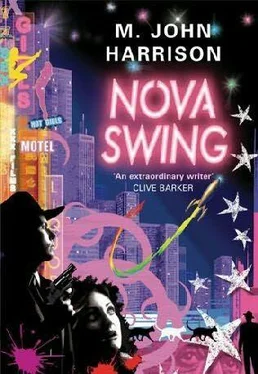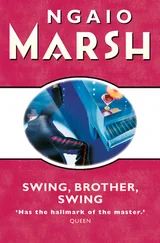"Forget it guys, this one's fucked."
They avoided Aschemann's car, although they sometimes tried to catch the eye of his assistant, whose reputation had reached them via one Bureau pipe or another. On her part, she had nothing to say. She leaned against the rear quarter of the Cadillac, radiating heat from her ramped-up metabolism-which, like most contemporary Preter Coeur product, had a stage by which it burned forty per cent of its own cellular waste-and treating everything but her datableed with contempt. She hadn't spoken since Vic got away.
"I'm feeling very shaken up," Aschemann told her.
He put his hand on her arm. "Thank you for everything you did; perhaps next time you could kill a few less people."
She shrugged.
"Are you angry?" he said.
"This was never an investigation. It was a mess."
Her eyes went out of focus; she said something flatly into her dial-up. She had called down another fire-team; but it was too late to catch Vic, and Paulie had never been her responsibility. When Aschemann reminded her of that, she levered herself angrily away from the Cadillac and stood off a few paces, looking in any direction but his. She knelt next to Alice Nylon and tidied the hair out of the peaky, dead little face. "I don't understand why any of this had to happen!" she said to Aschemann. "I don't understand why you have to pretend to be old, and get driven around in a car from the historical times. No one in this culture has to be old any more." She lifted Alice by the shoulders, shook her lightly-as if Alice had gone to sleep on some secret which if she had shared it would have changed both their lives-then allowed her to drop back again. "An escape is involved here," she reminded Aschemann. "I don't understand why you can't investigate the way everyone else does."
"I'm sorry," Aschemann said.
This response caused her to return to the car, look in at him in a thoughtful way and say, "What's your name?"
"Pardon?"
"What's your name?"
"You shouldn't have to ask," he said. "Aschemann."
"And that's how your wife spoke to you, is it? Aschemann, pass the hummus, Aschemann, slide the chair over to me so I can stand on it and fetch down this bottle of dark rum. Aschemann, we're old and will die one day."
Aschemann felt hurt at this.
"It's Lens," he said.
"Well then, Lens, it's been nice. You never once asked me my name, but at least now I asked yours. I resign."
"I don't-"
"I'm in for a transfer as soon as this disaster winds itself up."
He didn't seem to hear.
"When I left Utzie," he said, "she would dial me up and say, 'People think it's a failure to live alone, but it isn't. The failure is to live with someone because you can't face anything else.'" He chuckled. "Two days later it would be, 'Cooped up with yourself twenty-four hours a day, that's life, without remission. Lens, the worst thing in the world is to be inside yourself, you don't even want to be rescued. Yet to be as happy as we were-to be so open to someone else-invites the failure of everything.'" One minute she would be phoning to tell him her plans, she was going to have a garden behind the bungalow-wallflowers, poppies, an iris modified to smell of chocolate-the next her brother had died of bowel cancer. Who died of bowel cancer since the twenty-first century? It was a choice. That whole family had disaster as a lifestyle.
"No one has to lose anyone now," Aschemann said to his assistant. "Perhaps I wanted to know what that was like. Utzie-"
"I know all about Utzie," the assistant interrupted.
Aschemann stared at her. "Who made you responsible for me?"
"You make everyone responsible for you."
He watched her walk away and get into conversation with the uniforms. They were all clustered round the dying child now, he couldn't see why. "You were a good assistant," he called after her. "What are you afraid of, that you might learn something? How could you, when you know everything already?" Then he slid behind the wheel and started the car. He was happy enough with the way things had gone. He had lost Vic, but he still had Emil Bonaventure's notebook. He thought he would drive with the roof down, it was a nice enough day. He picked up first then second gear, nice considerate changes with the unhurried old engine well below its red line. Despite that, he was soon up to fifty or sixty miles an hour. He dabbed the horn at knots of uniforms. People were beginning to shout into their dial-ups. All across the Lots, they watched with mounting puzzlement as the roadster plunged across the concrete and into the interface mist. The assistant- who, if she were honest with herself, had all along expected something like it-loaded her tailoring to its operational limits in an attempt to cut him off; but it was already too late.
Perhaps ten minutes after Vic caught up with her, Elizabeth Kielar discovered abandoned in the road a plaster mannequin meant to represent a child of five or six years old.
It was naked, bald, a greyish-fawn colour, with a sweet, strange expression, the sort of demonstration piece you saw in the window of any Uncle Zip, outfitted with a black uniform beret from some recently-glamorised interstellar war, torso crawling with colourful live pins, the proteins for which had been derived from phyllobate DNA. Its arms were jointed at the shoulders to allow movement, but otherwise its body was moulded in one seamless piece. To the best of Vic's knowledge it had been lying there for a year and a half. He had to persuade her not to pick it up. She looked mutinous, then smiled and said:
"How sad he must be that he has no genitals!"
The shadow of an unseen bird flickered across a window at the end of the street.
"Vic, let's go that way!"
"Do you know why you're here?"
She wouldn't say. It was a contest of wills. "It's safer," he tried to explain, "if you keep your expectations low." But Elizabeth was already working them in deeper by the minute, her expedient simple: if he disagreed with her she simply walked away. The further off the beaten path Vic got, the more nervous he became and the easier it was to persuade him to take another wrong turn. It was what he had always feared.
The landscape continued to change, one moment residential and deserted (though you saw women waiting expectantly at a corner in their best clothes, they were gone as soon as you reached them); the next industrial and derelict. Flares rose from something like a coking plant in the distance, but everything close at hand was fallen down and overgrown. Old separation tanks became shallow lakes, with mudbanks streaked a dark chemical maroon. Something huge passed across the sky: you winced away from its shadow, then saw it was a toy duck looking down-looking in-at you from above with its intelligent bright-blue painted eyes. It was a hypermarket of the meaningless, in which the only mistake-as far as Vic could discern-was to have shopping goals. The idea that you might map things in there in terms of your needs was what had so entrapped and confused Emil Bonaventure's generation. It was safer to learn how things worked, then assemble the portfolio of habits, behavioural tics just this side of the psychotic regime, that stood in for having a clear frame of reference and kept the travel agent from harm.
"Everything smells of sulphur," Elizabeth said. "Does it smell of sulphur to you?" She said, "Do you ever go into a building while you're here? Vic, let's go in one of these buildings! We could fuck in a building, wouldn't that be nice? Wouldn't you be excited by that?" He explained to her why it was a bad idea. Soon after, her mood deteriorated. She was silent for long periods, then said bitter things in a tired, desolate voice, as if she was in conversation with some ex-lover. "Don't you see," she said, "that I can't talk now? Here?" Vic hadn't asked her to talk. "The life I'm living now," she said, "the life I've been living: I wasn't like this, but now I am." She said:
Читать дальше












